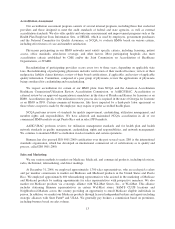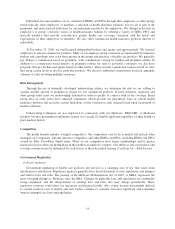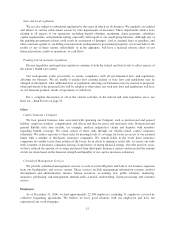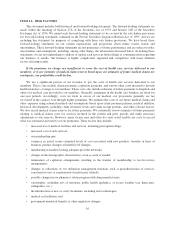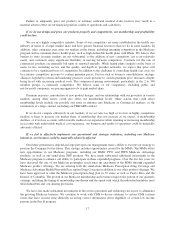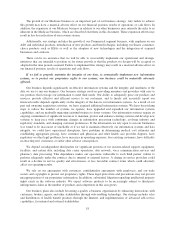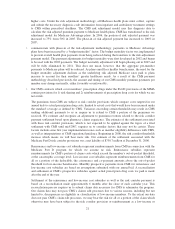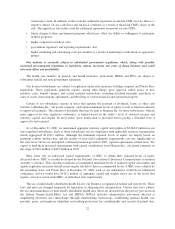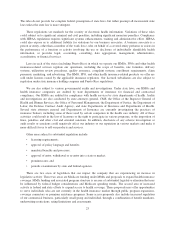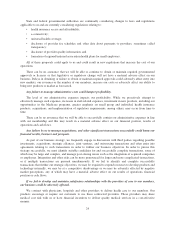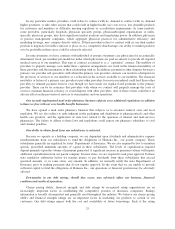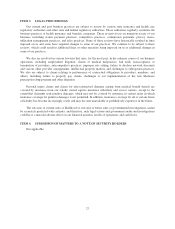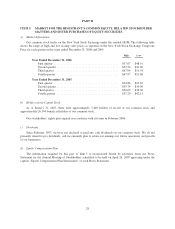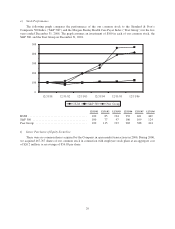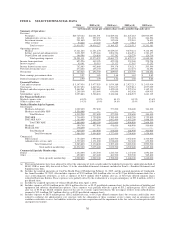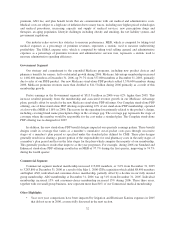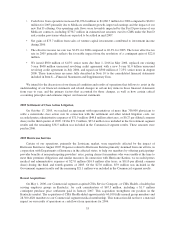Humana 2006 Annual Report Download - page 35
Download and view the complete annual report
Please find page 35 of the 2006 Humana annual report below. You can navigate through the pages in the report by either clicking on the pages listed below, or by using the keyword search tool below to find specific information within the annual report.The rules do not provide for complete federal preemption of state laws, but rather preempt all inconsistent state
laws unless the state law is more stringent.
These regulations set standards for the security of electronic health information. Violations of these rules
could subject us to significant criminal and civil penalties, including significant monetary penalties. Compliance
with HIPAA regulations requires significant systems enhancements, training and administrative effort. HIPAA
could also expose us to additional liability for violations by our business associates. A business associate is a
person or entity, other than a member of the work force, who on behalf of a covered entity performs or assists in
the performance of a function or activity involving the use or disclosure of individually identifiable health
information, or provides legal, accounting, consulting, data aggregation, management, administrative,
accreditation, or financial services.
Laws in each of the states (including Puerto Rico) in which we operate our HMOs, PPOs and other health
insurance-related services regulate our operations, including the scope of benefits, rate formulas, delivery
systems, utilization review procedures, quality assurance, complaint systems, enrollment requirements, claim
payments, marketing, and advertising. The HMO, PPO, and other health insurance-related products we offer are
sold under licenses issued by the applicable insurance regulators. Our licensed subsidiaries are also subject to
regulation under state insurance holding company and Puerto Rico regulations.
We are also subject to various governmental audits and investigations. Under state laws, our HMOs and
health insurance companies are audited by state departments of insurance for financial and contractual
compliance. Our HMOs are audited for compliance with health services by state departments of health. Audits
and investigations are also conducted by state attorneys general, CMS, the Office of the Inspector General of
Health and Human Services, the Office of Personnel Management, the Department of Justice, the Department of
Labor, the Defense Contract Audit Agency, and state Departments of Insurance and Departments of Health.
Several state attorneys general and Departments of Insurance are currently investigating the practices of
insurance brokers, including some of those used by certain companies in the health care industry. All of these
activities could result in the loss of licensure or the right to participate in various programs, or the imposition of
fines, penalties and other civil and criminal sanctions. In addition, disclosure of any adverse investigation or
audit results or sanctions could negatively affect our industry or our reputation in various markets and make it
more difficult for us to sell our products and services.
Other areas subject to substantial regulation include:
• licensing requirements;
• approval of policy language and benefits;
• mandated benefits and processes;
• approval of entry, withdrawal or re-entry into a state or market;
• premium rates; and
• periodic examinations by state and federal agencies.
There are two areas of legislation that can impact the company that are experiencing an increase in
legislative activity. These two areas are Medicare funding under MMA and proposals to expand health insurance
coverage. MMA funding and associated program structure is an area of substantial legislative attention that may
be influenced by federal budget considerations and Medicare spending trends. The second area of increased
activity is federal and state efforts to expand access to health coverage. These proposals may offer opportunities
to serve individuals who are not currently in the health insurance market through public program expansions,
coverage connectors or premium assistance programs. Some access proposals also include increased regulation
of our commercial business, particularly small group and individual, through a combination of benefit mandates,
underwriting restrictions, rating limitations and assessments.
23


